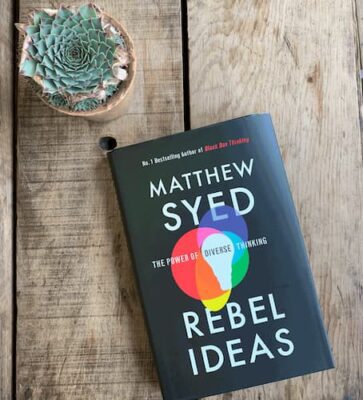Rebel ideas is a fantastic book by Matthew Syed for anyone thinking about innovation and leadership. Even if you aren’t I’d strongly urge you to read this book. In this article, I talk about 6 key takeaways, but the book is far richer than that. Based on your experience, I’m sure you’ll glean more insights and adapt to your own area of work.
The most common theme in this book for me is the need for rebels to grow and innovate continually. Almost all of us are told to follow rules but yet see fantastic results outside of these confines. The book challenges you to be a rebel and break these rules constructively. This doesn’t mean any disrespect to a system but sometimes rules are archaic and need to be changed to suit the current world. And that precisely is the beauty of this book to bring about innovation, the ability to solve complex problems and continually look forward in the business and startup world.
Rebel Ideas: Need for Diversity
Birds of a feather flock together – it is common lore, isn’t it? We tend to choose to work with people similar to us. We even get closer to people based on commonalities. Do we stop often and ask this question – is this similarity challenging us sufficiently?
- Matthew Syed in Rebel ideas talks about collective blindness i.e we are unaware of things that we are unaware of. Our backgrounds, environments define our experiences. If we choose to be in this niche, then easily, we forget the realities of the external world. In other words, we’re creating a version of reality which might not be the complete truth.
- The need for diversity is ever more important. It not only brings about a different line of thought, but challenges your perception as well. Most times, intelligence, metrics and scorecards are used as a measure while hiring people. Is it enough? Does innovation thrive when we don’t have a different view point?
Avoiding the HiPPO
I loved this abbreviation – Highest Paid Person Opinion. It is amazing to see the influence this highest paid person has in a group discussion. The influence of HiPPos is ever more prominent in a strategic discussion.
Does it allow for innovation to thrive? Do people challenge HiPPos sufficiently? Sadly, most organisational cultures are afraid of challenging their bosses. One of the most important questions to ask as a supporter of rebel ideas is – ideas are more important than the person. We ought to find ways to separate the idea from status.
Need for rebels vs clones
Rebels question your thoughts and make you think. Clones follow orders. What do you need for your organisation? If you’re building a startup, this is more important to ask. How do you build a culture where new ideas – although opposing are welcomed? It is easy to get caught up in our vision and think that it is the best way to go forward. But is that true though?
Is our vision alone sufficient to tackle a complex market? A simple problem might not need diverse thinking. But if you’re trying to solve a complex problem, you will benefit from diverse ideas. Ultimately, the solution is more important than the question of who came up with the idea.
Are you actively looking to create rebels in your organisation or promote clones? More importantly, are you aware of your bias towards this?
Crowds are not always wise – dissent is valuable
Personally, this is the best line from the book. Most times, we’re trying to appease the groups and get a common opinion. But we’ve seen popular opinions fail time and again. Just because a group of people agree on an opinion – doesn’t mean that it’s right.
In fact, it just fosters a herd mentality instead of promoting active engagement and listening. Listening skills are as important as talking in communication. The crowds have a way of pushing popular opinion because it is an easy thing to do. Rebel ideas are not just about popular ideas, but about handling challenging opinions and thoughts. It is also about creating an environment for active engagement.
Avoiding echo chambers to embrace rebel ideas
Echo chambers are perhaps the worst influencers. It is as if you’re surrounded by yes men who echo everything you say. It literally blinds you from being open to unpopular ideas and particularly the ones that oppose you.
We stand to benefit more from opposing ideas than people saying Yes to everything we do. This makes you wrongly believe in the notion that you’re right. With more people agreeing with you, it creates a false sense of confidence which is worse. The main purpose of these conversations and rebel ideas is to engage in a discussion. It helps you gather different points of view. If you aren’t doing that, you’re simply missing a trick to creating a brilliant organisation.
Big Picture
What is your big picture? I recently wrote about – the Inifinite game from Simon Sinek – it is finally about changing the field we are in. If we want to innovate and solve problems in the world – innovation is a great way. And it doesn’t happen if we are stuck in small excel sheets and numbers.
We ought to elevate the quality of games and the business we perform. It has to influence the end-user for the future. We are not just talking about increasing sales and numbers, but about people looking at us with respect and connection because we stand for something. And this stand can happen when we embrace rebel ideas in their natural elements.
Summary: Rebel Ideas
It is a fantastic book and I”m very thankful to the person who recommended this to me. Whether you’re a startup founder or someone keen on organisational behaviour, diversity or people in general – I would strongly recommend this book. Do keep an open mind because it will challenge you and ask you about your biases.
But that’s a great thing right? The source of all knowledge is awareness – we can be more open only when we know and embrace new knowledge. And that precisely is what this book will do for you. Happy reading :)
References: Image Source



Pingback: There's something artificial when everyone is agreeing - Inspire99